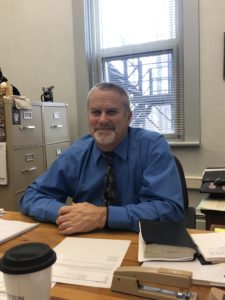Beginning in the fall of 2019, incoming students will have a new general education program, formally titled the Bluffton University Enduring Values General Education Program.

Randy Keeler. Photo by Aubrey Bartel
According to Associate Dean of Academic Affairs Randy Keeler, the new general education program uses more of a competency based approach in comparison to the academic discipline approach in place now.
The new program is divided into two component areas: the Mission Core and the Competencies. The Mission Core is four courses that “meet certain learning objectives within the mission core of the general education curriculum,” Keeler said.
The Mission Core includes a blend of new and familiar courses: Becoming a Scholar, Learning in Community, cross-cultural and Christian Values in a Global Community.
The second component area is made up of 10 Competencies. The Competencies are categorized as Writing Well, Speaking and Listening, Living Well, Creative Expression, Reading the Bible, Understanding Self and Society, Exploring the Past, Scientific Inquiry, Critical Analysis and Religious Understanding. Each of these competencies has a list of courses that may satisfy the requirement.
“These are 10 competencies that we want students to have, and those competencies have learning objectives—things that we want them to be able to do or begin to learn how to do,” said Keeler.
The new curriculum has been in the works since the spring of 2017 when a task force was established, and it was approved by faculty in the spring of 2018 for implementation in the 2019-20 academic year. The task force included representatives from each academic division on campus and a student representative.
Keeler said one benefit of the new program is the way it allows students to use some of their major courses to fulfill some of the competencies. This overlap will give students more room in their schedule for a minor or a double major. Additionally, Keeler said it makes financial sense.
“We were given a directive by the academic dean at that time to construct something new and creative, and also that would require less teaching hours to cut down expense,” Keeler said. “We’ve done that. This is definitely a different approach.”
Although the revisions to the general education program won’t have a strong impact on current students, there will be some benefits for them as well. Continuing students will be given a wider range of courses they can take for their general education requirements.
For example, in the existing general education program, there are seven courses approved to meet the upper-level religion requirement; this will expand in the new program under the Religious Understanding category.
“From this point forward, there’s additional courses, like Spiritual Formation and Youth Ministry I…that are going to be under the new Religious Understanding competency,” said Keeler. “We’re allowing continuing students to use all of those courses for their second-level general education class.”
The new curriculum is meant to be more experiential, said Keeler. For example, each of the four Mission Core classes has an experiential component to it: the creative project in Becoming a Scholar, the exploration of the Lima community in Learning in Community, the cross-cultural experience and the Community Task Force project in Christian Values in a Global Community.
“All those things feed into our mission statement of preparing students to be global citizens,” Keeler said. “Because of this, we think the Mission Core better reflects our mission statement [than the current curriculum].”
Further, under the new curriculum, only one science course and one social science course will be required, a decrease from the two each required in the current program.
“There were some people who were upset about some of the lessening of requirements in their area, but in general, faculty did a really good job of being resolute to work together and make something work that we could all benefit from as an institution and that students benefit from too,” Keeler said.






